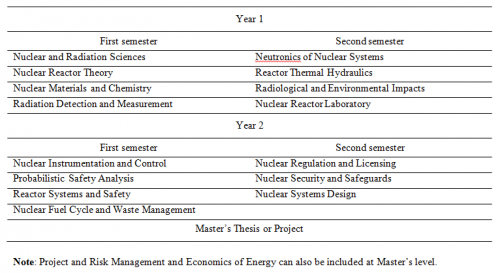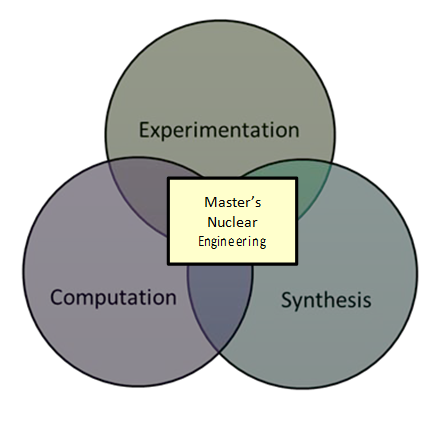Master’s degree
Definition
An academic degree granted to individuals who have undergone study demonstrating a mastery or high-order overview of a specific field of study or area of professional practice
Description
Curriculum
A Master's degrees are usually delivered by [University|universities], although in exceptional cases a college can also deliver Master's degrees in specific subjects. Generally this is the second degree what a student may achieve (the first one is the Bachelor's). The Master’s programme typically takes two years, but in some countries it can be completed in one year. Typically but not on all courses, depending on the requirements of the university, a Master’s project or thesis may be required. Within a degree programme, the university may choose to offer elective courses focusing on options or themes so that students can develop a stronger background in a technical area. As an example, a typical Master’s degree in nuclear engineering for nuclear power plants would encompass the following (see Table 2.).
Competencies of graduates with a master of nuclear engineering
The expectations and requirements for the graduates holding the Master’s degree are higher than for the Bachelor’s degree. This is in terms of both the depth and the breadth. For example, the schematic for the Master’s degree is shown in Figure 4.
The purpose of this diagram is to highlight the fact that at the Master’s level, the graduate should be able to integrate experimentation, computation and synthesis. This is key for the higher expectations of an individual holding the Master’s degree.
As with the Bachelor’s degree, a more detailed listing for the Master’s is given below. If the academic curricula stop at Bachelor's level, the employer has to complement the education with training providing the competencies at Master's level if his/her job responsibilities require Master's level capability. In all cases, students who will be employed in nuclear installations will have to undertake plant specific training, the scope and depth of that training is depending on the scope and quality of the degree programme.
It should be noted that a student can take a Master’s of Nuclear Engineering course without holding a Bachelor’s degree in nuclear engineering. For example, a Bachelor of Science in Physics or a Bachelor of Engineering (electrical, chemical etc.) could be sufficient to comply with the admission criteria. In that case, the Master programme has to provide these students with specialized courses covering core themes such as reactor physics, nuclear thermal hydraulics, nuclear fuels and materials, nuclear structural engineering, nuclear safety, nuclear power plants and radiation, while avoiding duplication for students holding a Bachelor’s degree in Nuclear Engineering. The graduate with the qualification of Master of Nuclear Engineering for nuclear power plants must have the competencies shown below.
General competencies
- MC-I Written and spoken English in professional and international settings, employing technically advanced terminology used in the nuclear power industry.
- MC-II Work collaboratively within a team and to exercise effective leadership of that team with good management skills while working towards a well-defined goal.
- MC-III Work independently, identify new directions, and demonstrate decision making capabilities within their sphere of expertise, and to have a commitment to professional development through their career.
Specific competencies
- MC-IV Understand thoroughly the basic and advanced laws of atomic and nuclear physics, chemistry and the relevant engineering sciences applicable to nuclear power plant technology.
- MC-V Be able to perform advanced mathematical analysis and numerical simulation of the various physics and engineering processes and systems in a nuclear power plant.
- MC-VI Understand data acquisition, storage and processing using recognized and accepted computer codes in the nuclear industry.
- MC-VII Be able to perform theoretical, numerical and experimental methodologies for analysis of thermo-physical processes.
- MC-VIII Use reactor experiments to characterize the basic physics in a nuclear reactor, by understanding and analysing the resulting data.
- MC-IX Understand nuclear power plant systems, with all the principal components.
- MC-X Design relevant systems by synthesizing the collective knowledge gained in all relevant disciplines.
- MC-XI Be committed to safety and understand safety culture.
- MC-XII Understand the regulatory process, the role of the regulator in nuclear power plant licensing and operation, and the main regulatory requirements for a nuclear power plant.
Requirements for a graduate with a master of nuclear engineering
As noted above, the Master’s degree recipient is expected to have additional capabilities beyond the Bachelor’s degree. Upon completion of the degree of Master of Nuclear Engineering for nuclear power plants, the student must know the following (Knowledge), be able to demonstrate application of the knowledge (Demonstration), and know when to implement the knowledge (Implementation):
Knowledge
- M1.1 Advanced concepts of differential and integral calculus, probability theory and mathematical statistics, theory of functions of complex variables, vector and harmonic analysis, differential equations and partial differential equation systems, Green’s functions, and advanced mathematical analysis.
- M1.2 Electrical and magnetic phenomena, quantum mechanics and statistical physics, and physics of atomic nucleus.
- M1.3 Neutron transport theory and Monte Carlo analysis.
- M1.4 Basic elements of reactor experiments, approach to critical, measurement of reactor parameters, feedback mechanisms, analysis of data and the relationship to reactor theory.
- M1.5 Laws of heat and mass exchange, and the characterization of thermo physical processes in heat exchangers, steam generators and safety systems for heat removal in nuclear power plants.
- M1.6 Methods for detection of ionizing radiation, principles and design of radiation shielding, utilization of the ALARA principle and health effect of ionizing radiations.
- M1.7 Structural analysis of complex systems.
- M1.8 Use of information technology and numerical analyses, problem definition, and evaluation of results.
- M1.9 The various types of nuclear power plant systems, the principal components and their roles.
- M1.10 The role and importance of reactor safety, and the practices and procedures in a nuclear power plant to assure safe operation.
- M1.11 The components of the nuclear fuel cycle, the open and the closed fuel cycles, classifications of waste, handling, storage and disposal of the various types of radioactive waste, short-term and long-term biological effects of ionizing radiation.
- M1.12 Issues of nuclear non-proliferation, the role of safeguards, the Nuclear Non-proliferation Treaty and international agreements, and role of the International Atomic Energy Agency.
- M1.13 Concepts of physical protection of nuclear installations, nuclear security applied to nuclear materials, radioactive sources and nuclear facilities.
- M1.14 Principles of project management, and the utilization of these principles in an industrial organization.
- M1.15 The role of the regulatory authority, and how regulations are implemented and followed in a nuclear power plant.
- M1.16 Awareness of the technical and regulatory literature relating to nuclear power plants and their operation, familiarity of how to access and evaluate reports and articles.
Demonstration
- M2.1 Draw from the technical literature and develop independent analyses for nuclear power plant technology related problems.
- M2.2 Calculate main characteristics of random values, to solve the problems as applied to any real processes.
- M2.3 Develop mathematical models of thermo physical and neutronic processes in nuclear power facilities.
- M2.4 Utilize recognized and accepted computer codes to determine technical solutions, and evaluate the validity of those solutions.
- M2.5 Develop designs for new technical devices with accounting for the requirements previously defined.
- M2.6 Carry out testing of the main components in nuclear power plants, and perform technical analysis of the operation of these components.
- M2.7 Develop the methodologies for safety upgrading of nuclear technologies.
- M2.8 Develop projects meeting technical requirements and standards as needed in a nuclear power plant.
- M2.9 To perform economic analyses for new procedures, systems or strategies that might be used in a nuclear power plant.
- M2.10 Develop management strategies for carrying out the mission of a nuclear power plant to generate electricity in a safe, economical and secure way.
Implementation
- M3.1 Design and implement the realization of new products or systems with applications to nuclear plant.
- M3.2 Design and implement the realization of new products or systems with application to radioprotection, nuclear safety, and nuclear security.
- M3.3 Design and realize new rules or processes for improving the management, the quality, the safety within a nuclear environment.
- M3.4 Technical English with usages and applications to a nuclear power plant and its associated technology.
- M3.5 Analytical and numerical methodologies for solving algebraic and differential equations, and processing of experimental data.
- M3.6 Methodologies for theoretical and numerical studies of thermo physical and neutronic processes.
- M3.7 Current computing techniques solving special problems. Standard computer code packages, various and finite-difference methodologies for solving second-order ordinary differential equations, and for the solution of boundary- value stationary problems, and the evaluation of experimental errors.
- M3.8 Methodologies for planning and conducting experiments, for fabrication of experimental installations, and for the organization of research and development studies.
- M3.10 Technical documents and publications, progress reports, handbooks and other information resources.
- M3.11 Methodologies for the design of components for nuclear power plants.
- M3.12 Project management skills to carry out collaborative efforts with other team members, for assessing the quality and efficiency of the personnel, and upgrading the personnel performance.
- M3.13 Organizational and managerial decision tools including knowledge management to achieve optimum outcomes with respect to quality, reliability, economy, safety and the protection of the environment.
- M3.14 Legislative and regulatory requirements for the safe and environmentally sound operation of a nuclear power plant.
- M3.15 Basic presentation and pedagogical skills.
References
[1] Nuclear engineering education: A competence-based approach in curricula development


